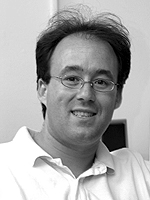Word Learning in Children
3 Aug, 2007 10:59 am
Bob McMurray is a speech learning specialist. He explains his study on children's word aquisition ability and how this relates to learning in general.
I would like to add that I think a very critical part of it is the fact that children are learning more than one word at the same time. They are not waiting to finish learning mommy in order to learn daddy. They are actually trying to learn lots of words all at once, which is a critical part of explaining the acceleration.
Can you explain in further detail?
What we’re trying to understand is this acceleration that everybody talks about. Anybody who is a parent would probably resonate with the fact that at some point children go crazy naming things. They start using a lot of new words and seem to be learning a couple new words a day. We always thought that there was something that happens, that is that something flips on at that point. There are dozens of different mechanisms that could account for this, but that has been the standard story, an intuitively appealing one.
However, what we are trying to show with this study is that much simpler computational mechanisms could actually account for the spurt. You don’t need a lot of specialized things to flip on to obtain the acceleration. It is a natural by-product of language structure; the fact that words are varying and how hard they are, and that children are learning them all at once. In some sense nothing special is happening.
How was this study carried out?
It was mostly a computational study. When I started out I had an insight that there was going to be a variation of difficulty in the parallel learning that was really responsible for the spurt. I actually created an excel spreadsheet and ran some equations, which took all of a half an hour. At that point, when I started to understand the mathematics of it, developed a more formal model using a couple of other programming languages and analyzing the results of those, I got to the point where I understood the limit conditions in almost a mathematical sense. I understood what components of the model were and weren’t essential until I was able to generalize the model to this broad situation. The initial model relied on a Bell Curve distribution of how difficult the words were. As I came to understand the model I realized that that was not an important assumption, and that you could do it with just about any distribution of difficulty.
Does this study have any impact on our understanding of learning in general?
I think it does. Indeed, it was one of the directions that I wanted to go with this. What I think this tells us is that a general learning principle can get us a long way. People have often treated word learning as sort of specialized phenomenon that needs to be studied outside of the traditional way we learn other things. This suggests that general principles could be sufficient. In fact, one of things we want to do is to try and generalize this study to non-linguistic domains. That is the other flip side; the kinds of approaches we use to study word learning now might be applicable to studies, like say, how people learn different motor patterns or different concepts. What I hope to do in the long run is to look at word learning as one of these generalized processes as opposed to a special thing that exists with its own rules and processes, but to think about it as a more general phenomenon. Then after, examine other phenomenon using some of the other techniques we used to study word learning.
Interview by: Christopher Le Coq
Bob McMurray is a assistant professor in the Department of Psychology & in the Iowa Center for Developmental & Learning Sciences at the University of Iowa
Reference: Science Vol 318 August 3, 2007







 Read more
Read more